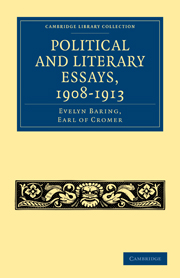Book contents
- Frontmatter
- PREFACE
- Contents
- “THE EDINBURGH REVIEW”
- “THE QUARTERLY REVIEW”
- “THE NINETEENTH CENTURY AND AFTER”
- “THE SPECTATOR”
- VIII DISRAELI
- IX RUSSIAN ROMANCE
- X THE WRITING OF HISTORY
- XI THE GREEK ANTHOLOGY
- XII LORD MILNER AND PARTY
- XIII THE FRENCH IN ALGERIA
- XIV THE OTTOMAN EMPIRE
- XV WELLINGTONIANA
- XVI BURMA
- XVII A PSEUDO-HERO OF THE REVOLUTION
- XVIII THE FUTURE OF THE CLASSICS
- XIX AN INDIAN IDEALIST
- XX THE FISCAL QUESTION IN INDIA
- XXI ROME AND MUNICIPAL GOVERNMENT
- XXII A ROYAL PHILOSOPHER
- XXIII ANCIENT ART AND RITUAL
- XXIV PORTUGUESE SLAVERY
- XXV ENGLAND AND ISLAM
- XXVI SOME INDIAN PROBLEMS
- XXVII THE NAPOLEON OF TAINE
- XXVIII SONGS, PATRIOTIC AND NATIONAL
- XXIX SONGS, NAVAL AND MILITARY
- INDEX
XX - THE FISCAL QUESTION IN INDIA
Published online by Cambridge University Press: 07 September 2011
- Frontmatter
- PREFACE
- Contents
- “THE EDINBURGH REVIEW”
- “THE QUARTERLY REVIEW”
- “THE NINETEENTH CENTURY AND AFTER”
- “THE SPECTATOR”
- VIII DISRAELI
- IX RUSSIAN ROMANCE
- X THE WRITING OF HISTORY
- XI THE GREEK ANTHOLOGY
- XII LORD MILNER AND PARTY
- XIII THE FRENCH IN ALGERIA
- XIV THE OTTOMAN EMPIRE
- XV WELLINGTONIANA
- XVI BURMA
- XVII A PSEUDO-HERO OF THE REVOLUTION
- XVIII THE FUTURE OF THE CLASSICS
- XIX AN INDIAN IDEALIST
- XX THE FISCAL QUESTION IN INDIA
- XXI ROME AND MUNICIPAL GOVERNMENT
- XXII A ROYAL PHILOSOPHER
- XXIII ANCIENT ART AND RITUAL
- XXIV PORTUGUESE SLAVERY
- XXV ENGLAND AND ISLAM
- XXVI SOME INDIAN PROBLEMS
- XXVII THE NAPOLEON OF TAINE
- XXVIII SONGS, PATRIOTIC AND NATIONAL
- XXIX SONGS, NAVAL AND MILITARY
- INDEX
Summary
“The Spectator,” July 19, 1913
Sir Roper Lethbridge says that his object in writing the book which he has recently published (The Indian Offer of Imperial Preference) is to provoke discussion, but “not to lay down any dogma.” It is related that a certain clergyman, after he had preached a sermon, said to Lord Melbourne, who had been one of his congregation, “I tried not to be tedious,” to which Lord Melbourne replied, “You were.” Sir Roper Lethbridge may have tried not to dogmatise, but his efforts in this direction have certainly not been crowned with success. On the contrary, although dealing with a subject which bristles with points of a highly controversial nature, he states his conclusions with an assurance which is little short of oracular. Heedless of the woful fate which has attended many of the fiscal seers who have preceded him, he does not hesitate to pronounce the most confident prophecies upon a subject as to which experience has proved that prophecy is eminently hazardous, viz. the economic effect likely to be produced by drastic changes in the fiscal system. Moreover, his pages are disfigured by a good deal of commonplace invective about “the shibboleths of an obsolete Cobdenism,” the “worship of the fetish of Cobdenism,” and “the bigotry of the Cobden Club,” as to whom the stale fallacy is repeated that they “consider the well-being of the ‘poor foreigner’ ” rather than “our own commercial interests.” Language of this sort can only serve to irritate.
- Type
- Chapter
- Information
- Political and Literary Essays, 1908–1913 , pp. 327 - 339Publisher: Cambridge University PressPrint publication year: 2010First published in: 1913



